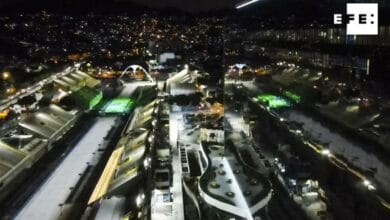Australia says Djokovic’s presence may encourage anti-vaxxers

Sydney, Australia, Jan 15 (EFE).- The Australian government decided to cancel the visa of Serbian tennis player Novak Djokovic for the second time because his presence could encourage the movement against the Covid-19 vaccine, according to a document published Saturday.
In a 258-page document presented to the Melbourne Federal Court, Australian Immigration Minister Alex Hawke detailed the reasons why he decided, after five days of consideration, to suspend Djokovic’s visa.
“Mr. Djokovic’s ongoing presence in Australia may lead to an increase in anti-vaccination sentiment generated in the Australian community, potentially leading to an increase in civil unrest of the kind previously experienced in Australia with rallies and protests which may themselves be a source of community transmission,” said Hawke in the document.
“Mr Djokovic’s conduct after receiving a positive Covid-19 result, his publicly stated views (against vaccination), as well as his unvaccinated status, I consider that his ongoing presence in Australia may encourage other people to disregard or act inconsistently with public health advice and policies in Australia,” he added.
Meanwhile, Djokovic was transfered to a hotel that serves as a an immigrant detention center in Melbourne after meeting with his lawyers.
The tennis player arrived at the Park Hotel, where he was earlier detained on Jan. 6 – when his visa was first canceled -, wearing a green tracksuit and a face mask, according to footage on public broadcaster ABC.
Djokovic had permission to meet with his lawyers in the morning and discuss the arguments ahead of his appeal hearing on Sunday.
The world number one tennis player had entered the country last week with a medical exemption for not being vaccinated, citing recovery from a recent Covid-19 infection.
The minister admitted the presence of Djokovic, who according to medical documents overcame the disease in December, represents an insignificant risk of spreading the virus, but his presence in the country can stoke the feelings of those opposed to vaccination.
Around 92 percent of Australia’s target population has already received both vaccination doses, while booster shots are being administered.
However, there are still thousands of people who have demonstrated during the pandemic against the vaccination drive and the harsh restrictions implemented by the authorities.
Some of these protests led to clashes against the police in Melbourne, the city with the longest period in the world under strict confinement, suming up to 262 days in six separate phases.
On Monday, a Melbourne court overturned the Australian border authorities’ decision to cancel Djokovic’s visa after he arrived in the country last week with a medical exemption.
But on Friday, Australia’s immigration minister used his personal powers to cancel the visa of world tennis No. 1, throwing the Serbian’s Australian Open defense into turmoil.
Djokovic met with his lawyers on Saturday and is expected to attend a hearing on his deportation on Sunday, a day before the Australian Open kicks off.
On Wednesday, Djokovic admitted “human error” was made in his travel declaration to enter Australia, and that he attended an interview with a French media outlet last month in Belgrade despite knowing that he had Covid-19.
On Thursday, he was included in the draw for the Australian Open where he is seeking his 10th Australian Open title and a record 21 Grand Slam trophies.
Australia is experiencing a surge in Covid-19 cases, which have gone from less than 2,000 infections a day in December to almost 150,000 this week. EFE
wat-nc/sc





